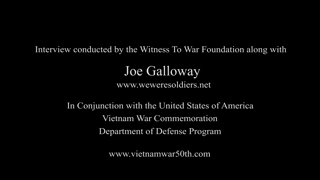6:12 | Freddie Owens reveals his most vivid memory of Vietnam, the desperate run of Capt. George Forrest right through the middle of an ambush. He also talks about the best and worst days of his tour.
Keywords : Freddie Owens Vietnam Ia Drang George Forrest LZ Albany R & R Clyde Hofmeister Medal Of Honor Vincent Locatelli Joe Galloway

He had already been in the Army for four years, serving in Germany and seeing the construction of the Berlin Wall. Freddie Owens then went to Fort Benning where he trained many of the men who would ship out to Vietnam with him. They went the old fashioned way, by troop ship.
No one got any sleep that first night in Vietnam. Freddie Owens recalls the tension among the men, most of whom he had trained. This bond would make it tough for him later on when the dying started. His unit went straight into the field and stayed there. Not a chance they would get to see Bob Hope but they did claim to run into some Chinese troops.
As the battle of the Ia Drang Valley began, Freddie Owens had to hunker down and listen to the fire from a couple of miles away. He knew there were enemy battalions in there and he feared a bloodbath. Moving in the second day, he saw the grim results of the battle so far, an unbelievable scene of death and destruction.
Freddie Owens shares his experiences during the ill-fated march to Landing Zone Albany during the battle of the Ia Drang Valley. His company was attached to another unit and was bringing up the rear. He credits his company commander, George Forrest, with saving them after the column walked into an ambush.
Freddie Owens reflects on the heroic actions of CPT George Forrest during the battle of the Ia Drang Valley. He saved the day, but still, men were lost. One was the baby of the unit, eighteen year old Vincent Locatelli. Owens felt that if he could keep young Vincent alive, he could do it for the others.
After the column was devastated by an NVA ambush, wounded Americans were scattered in the darkness. After his captain heard one such group calling for help on the radio, Freddie Owens joined a patrol to find them, guided by a gunshot every few minutes. Once there, medic Daniel Torres volunteered to stay with those who couldn't move and protected them through the night with medicine and a machine gun.
Freddie Owens looks back at the devastation he faced at LZ Albany and balances that against the joy he feels when he sees the offspring and grandchildren of those who didn't survive. These are feelings that he tried, and failed, to express in written form.
Freddie Owens says they paid no attention to news from home while in the field in Vietnam. They were trying to survive a war and didn't need the distraction. He certainly paid attention when he got home and there was a mob outside the airport.
Freddie Owens has maintained contact with his fellow veterans from Vietnam, sometimes talking them out from under the bed in the middle of the night. His own healing was incomplete when he saw the Twin Towers fall on 9-11 and that became a turning point for him.
Freddie Owens says there is a difference between Vietnam veterans and the veterans returning from wars today. Those people are worse off and in terrible shape after multiple combat tours. Although he was able to put his life in order after his war experiences, not everyone is so lucky.
The man was a World War II veteran and he was clutching a flag at the dedication of the Vietnam Veterans Memorial. Freddie Owens tells his remarkable story and how he became the subject of a famous photograph. And don't you tell him that the Wall doesn't talk to you.